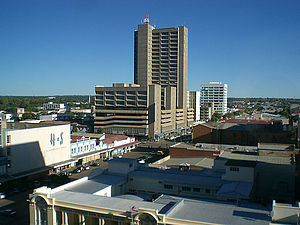The MDC Alliance has scoffed at claims by a government official that sanctions caused the de-industrialisation of Bulawayo, arguing that warped priorities by the government and economic decline are to blame.
While calling for the removal of sanctions on October 25, Bulawayo’s Provincial Affairs and Devolution Minister, Judith Ncube, said massive job losses for more than a decade in what was once the country’s industrial hub were a direct result of illegal sanctions imposed on Zimbabwe.
October 25 was set by SADC as a day to speak against and lobby the United States and allies to remove the sanctions imposed on Zimbabwe, saying their effects were now affecting neighbouring countries.
But MDC’s Bulawayo Provincial Spokesperson, Swithern Chirowodza, argued there were several factors that led to the city’s de-industrialisation and urged government officials to be honest.
“Bulawayo’s Industry was destroyed through the continuing relocation of industries to Harare. The fast track land resettlement programme destroyed our industry, which as a country was 33 percent agro-based. The knock-on effect was massive. One example is that the government ended up issuing a directive to protect dairy farms from land invasions. Zimbabwe now pays South Africa a huge cheque monthly to import milk and milk products,” he claimed.
Chirowodza cited corruption as a factor that destroyed business and listed the National Railways of Zimbabwe (NRZ), as one company that was brought down to its knees.
“The NRZ saw huge business disappear after cronies of Zanu PF ministers were awarded contracts to ferry goods from Matabeleland North to the rest of the country via Bulawayo. In addition, the indigenisation policy saw big companies like ZECO Holdings and GND being taken over by incompetent Zanu PF-aligned spendthrifts,” he said.
“Corruption has seen government squander monies reserved for the Nkayi road and the stories associated with ZINARA do not inspire hope.”
In 2016, then Deputy Minister of Agriculture, Mechanisation, Irrigation and Development Responsible for Livestock, Paddy Zhanda, told delegates in Bulawayo that corruption was deeply embedded in Zimbabwe and had a more telling blow on the economy than sanctions.
“I hate to admit it, but we cannot hide from the truth, corruption is cancerous in Zimbabwe. In fact, I am convinced that it has cost us more than sanctions. I don’t like to talk about areas that are not under my jurisdiction, but I will, Dr (Douglas) Mombeshora (the Minister of Lands and Rural Resettlement) had to fire most land officers because they were corrupt. Most of them were now driving Mercedes Benzs. Where did they acquire the money to buy those luxury cars? From corrupt activities,” Zhanda said at that time.
The MDC provincial spokesperson added that Zimbabwe’s Look East policy saw the failure to regulate imports especially Chinese raw materials that hurt Bulawayo’s textile industry.
“In some instances, Chinese finished products sold far cheaper than Zimbabwe’s unprocessed textiles. Government has an obligation to protect local industry,” he said.
“The pre-independence trade industry between South Africa and Zimbabwe could only be maintained if Zimbabwe maintained its competitive edge. But a lack of industry and a calamitous pricing regime saw Zimbabwe turned into South Africa’s warehouse.”
The government’s failure to implement devolution, said Chirowodza, was what hastened the death of industry in Bulawayo.
“Lack of devolution put a lid on the coffin. Bulawayo is still unable to utilise revenue generated in its jurisdiction. The junta pays lip service to devolution, which it abhors because once genuinely implemented it would not be able to access the mineral resources in various provinces. These and other reasons clearly show that the sanctions mantra is merely an excuse for failure,” said the MDC Alliance provincial spokesperson.

